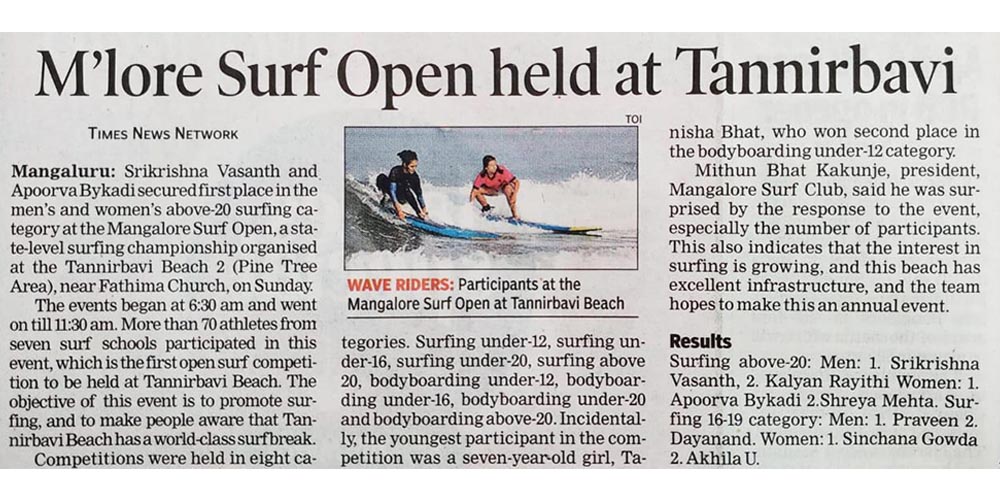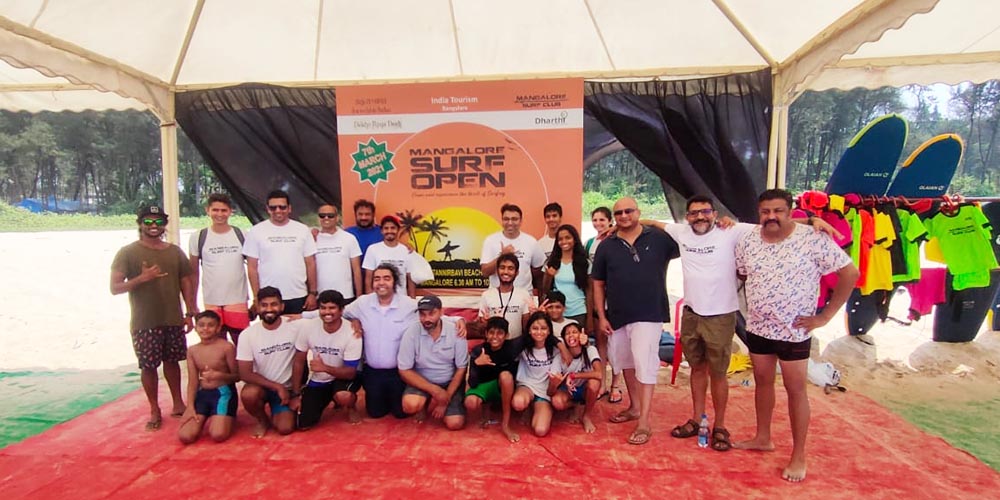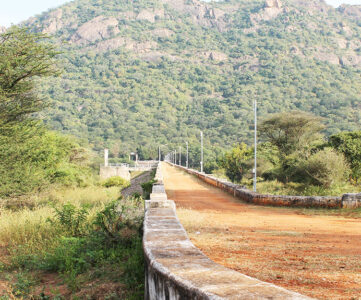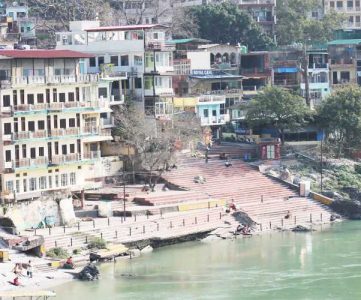Wanderlusting In Coastal Karnataka:
This article contains a researched write up on Blue Flag Beaches with India Approach, my visit to one blue flag beach in Coastal Karnataka and a special feature on Scuba Diving (Kapu Beach) and Surfing (Tannirbhavi Beach). It is highly recommended that a discerning traveler to the West Coast, gifts oneself the experience of undertaking water sports. There are umpteen to choose from. I have restricted my views to the ones I have seen, real-time. I have high regards for the Coastal folks, their hospitality and large-heartedness, they love their land, its waters, their food, wine and deep-rooted culture. They dwell effortlessly in the heat and bathe their hearts in the spirit of the ocean’s sands!
Happy Reading!
Freeda
Blue Flag Beaches: an inclusive approach to conservation and tourism
A Blue Flag beach, marina or boating operator is not only a place to give a sense of pride to the community and to attract tourism, but it also promotes environmental issues and awareness.
With more than 60 member countries across the world, and close to 4700 beaches, marinas and sustainable boating tourism operators, the concept of Blue Flag was created in France in 1985, by the Office of the Foundation of Environmental Education in Europe, where French Coastal municipalities were awarded the Blue Flag based on the criteria covering sewage treatment and bathing water quality. Eleven French Municipalities received the certification in 1985, and from then on, what was a one country-oriented classification scheme, moved to the European Union (EU) in 1987 under the umbrella of The Foundation for Environmental Education in Europe (FEEE).
By 2001 the FEEE norms were changed to incorporate other non-EU organizations and the Foundation for Environment Education (FEE,Denmark) (www.fee-international.org) was found. With many other countries joining in the schemata, the regional variations were added to the criterion. It was in this year, that the European Blue Flag became the International Blue Flag. South Africa with a vast beach network, became the first country outside of EU to accept the Blue Flag norm. Thence, by 2006 an International criterion with regional variations came into existence. By 2016 the Blue Flag accreditation was extended to Boat-based tourism activities with nature watching (whale watching, bird watching, cage diving to mention a few), recreational fishing, diving, and crewed charter tours.
| Country | Beaches | Marinas | Boats | Total Site |
| Spain | 590 | 94 | 5 | 689 |
| France | 401 | 106 | – | 507 |
| Greece | 485 | 14 | 6 | 505 |
| Turkey | 482 | 18 | – | 500 |
| Italy | 407 | 75 | – | 482 |
FEE’s Blue Flag criterion, includes within its ambit, standards for quality, safety, environmental education and information, the provision of services and general environmental management (www.blueflag.global/criteria) Europe, Canada, Morocco, Tunisia and other countries get to know the awards of Blue Flag on 5th June every year and the other Beach locations are announced with certifications on 1st November.
The Sustainable Development Goals (SDGs) (www.un.org) too are juxtaposed with the Blue Flag norms and criterion that helped it go a step forward in promoting Sustainability in the tourism sector. The SDGs and the goals of Blue Flag will clearly ensure adherence to the norms as envisaged and help the communities become an important element in development of the area identified.
The top five countries with accreditation of the Blue Flag from across the Globe are the following (2020): (click for other countries: https://www.blueflag.global/all-bf-sites)
Where Does India Stand?
As per an answer to a Starred question in the Lok Sabha (Lower House of Parliament) dated 30th April 2013; the 12 states (Provinces) and Centrally Administered Union Territories (UT) in India have a coastline of 7516.6 Kilometres, which provides a vast opportunity to Blue Flag with the plentiful of beaches that abound India. Though India has started late, with the Federal Government requesting the FEE to certify eight beaches in 2018; it was only by October 2020 that the Jury certified the beaches according to its schedule; a beginning was made, and the following beaches were certified:
| SL NO | Name Of Beach | State / Province |
| 1 | Rushikonda | Andhra Pradesh |
| 2 | Radhanagar | Andaman and Nicobar Islands |
| 3 | Ghoghla | Diu |
| 4 | Shivrajpur | Gujarat |
| 5 | Kasargod | Karnataka |
| 6 | Padubidri | Karnataka |
| 7 | Kappad | Kerala |
| 8 | Golden Beach | Odisha |
It was a daunting achievement for India, as FEE had certified a total of eight beaches (India had identified 13 beaches, the others were, Bhogave (Maharashtra), Kovalam (Kerala), Eden (Puducherry), Miramar (Goa) and Bangaram (Lakshadweep) which were dropped) at one go, based on the 33 stringent criteria. The program of Blue Flag Beaches in India was managed by the Government of India, Ministry of Forests, Environment and Climate Change which has further launched a special purpose vehicle, a “Eco-Label” BEAMS: (Beach Environment & Aesthetics Management Services) under the Integrated Coastal Zone Management (ICZM)which will further augment a position of power, considering that by 2023 India desires to have a network of 100 Blue Flag beaches in the country.
Eden Beach in Chinna Veerampattinam near Puducherry has become the first beach in the Union Territory and Kovalam beach in Tamil Nadu has received the coveted ‘Blue Flag’ to get the certification this year, taking the number of Blue Flag beaches in the country to 10.
Kasarkod Blue Flag Beach – Honavar
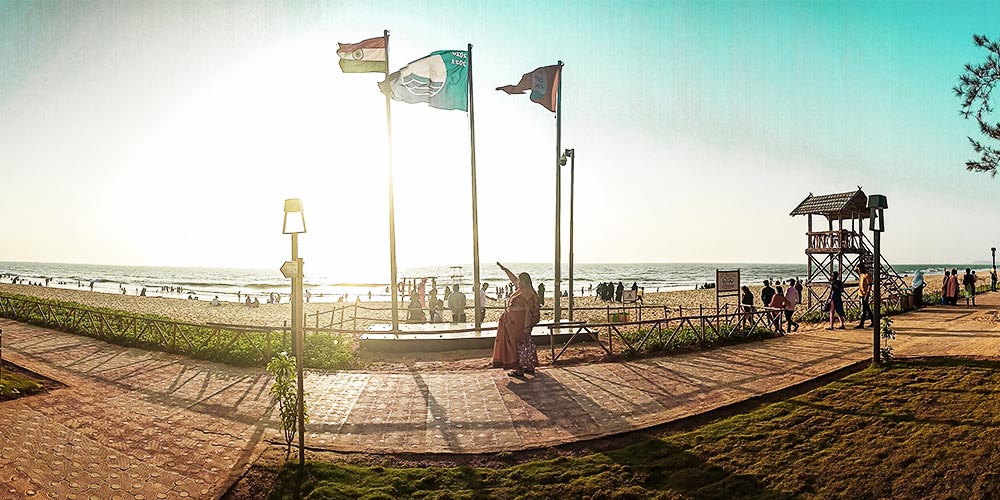
Kasarkod Blue Flag Beach, Honavar, Karnataka
While on my visit to one of the Blue Flag beaches in Karnataka, Kasarkod, Uttara Kannada District, I was awestruck by the very sight of the cleanliness and the quality of the waters. It was white sand and blue waters!
The shoreline was dotted with an arrangement for Tourist’s facilities, including washrooms, with changing facility, information centre, an eco-park and the credit of being the first certified Eco Beach in Karnataka. There were volunteers on constant patrol looking for trash and picking them up. Then there were tourists, awestruck by the sheer difference, of seeing a beach so neatly kept, obviously taking time to realise that they still were on an Indian Beach! The road leading to the beach was speckled on either side with Casuarina trees, giving it a picture-perfect look
Here I met Yeshwanth, He’s the guy who watches over, as you take a plunge, he eloquently quotes,
“I am happy to be able to save lives, I was a web designer in Mumbai, now I live in my hometown and have a yearlong job” As a lifeguard, I am Happy, because I watch over lives and I’m bestowed with the responsibility of saving theirs.”
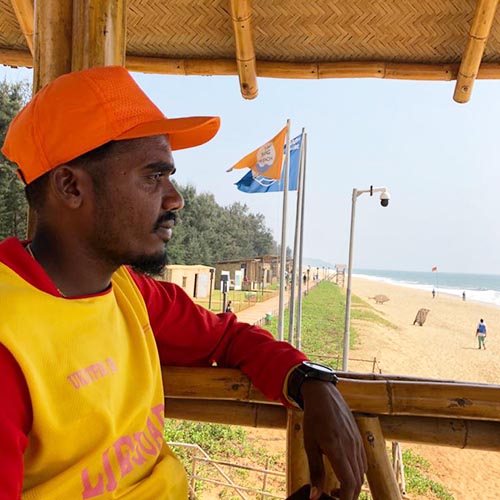
Yeshwanth-The-Lifeguard-Picture-by-Freeda-
Following the success of Kasarkod and Padubidri in Karnataka ; the Union Government is keen that Tannirbhavi near Mangaluru, Kodi beach in Kundapura, Idya in Surathkal, Bailur in Murdeshwar and Karwar in Uttar Kannada would also get certified as Blue Flag. The Environmental Management and Policy Research Institute (EMPRI) that works under the Department of Ecology and Environment of the Government of Karnataka has been entrusted with the responsibility of ensuring cleaner beaches, prior to certification from the Blue Flag authorities.
Special Feature
Kapu Beach And Scuba Diving
Well, for me it was a sure surprise that the mainland (India) had scuba diving! I pinched myself to believe that Kapu Beach did have West Coast Adventures (www.westcoastadventures.in) conducting diving escapades. One can undertake diving close to the shore itself, as one witnesses amazing diversity of vegetation and fish life. Generally, the dive is done near Mulki rocks, 8 kms from the shoreline, where rock formations abounds and big predators like groupers and snappers have made this their home. Two very striking and one of its kind experiences of Kapu is, the presence of a shipwreck and night diving.
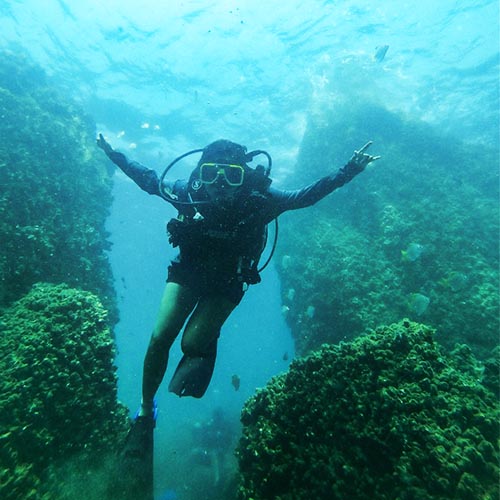
A young scuba diver and (Left) Honeycomb Morey Eel.
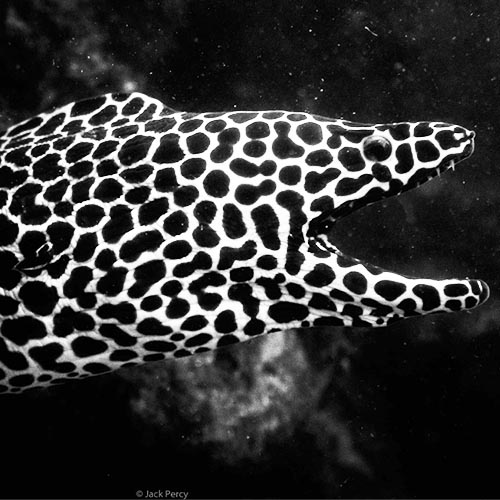
Picture Courtesy: Jack of West Coast Adventures.
Tannirbhavi And Surfing
Mangalore Surf Club (MSC/ surfmangalore.com) has been conducting Surfing classes at Tannirbhavi Beach since 2015. Having been registered as an Association under The Societies Act, 1960, MSC is a non-profit organization with a vision of imparting surfing skills in addition to water safety for Mangalore and the nearby regions. In addition to being a surf school, MSC has 6 of its members who are certified by the American Heart Association as “Heartsavers” – wherein First Aid and CPR skills are imparted. These members have actively been providing free CPR Training sessions for Lifeguards at the beach and to the general layman at various gathering and events in and around Mangalore. In addition to this, three members of MSC are currently undergoing a rigorous Lifeguard Training programme which is certified by the ILLSF (Indian Lifesaving & Lifesaving Sports Federation).
While attending the Mangalore Surf Open, at Tannirbhavi (surveyed for future Blue Flag certification), I was in continuous conversations with the Surfers, Mithun, President and Chirag, Secretary of MSC, and the locals who had come to witness the event. They seemed mighty thrilled that the beach where they hold all their activities of promoting adventure tourism and even educating the masses, will come on the global map of beaches, through the Blue Flag certification. What’s unique about the surfing program at Tannirbhavi is that the fisherfolk have taken keen interest and participate in the events and have come along as ace surfers.
Chirag the Secretary of MSC registers that, Surfing, as a sport has been enjoyed by all and Mangalore Surf Club has trained over 4,000 surfers between the age groups of 5- 65. Currently there are more than 100 life members who are taking the club forward with a vision to impart world class surfing skills at Mangalore’s coastline
